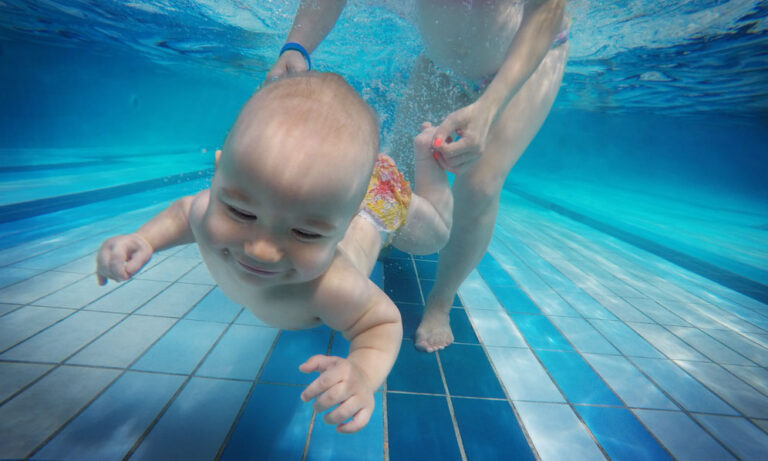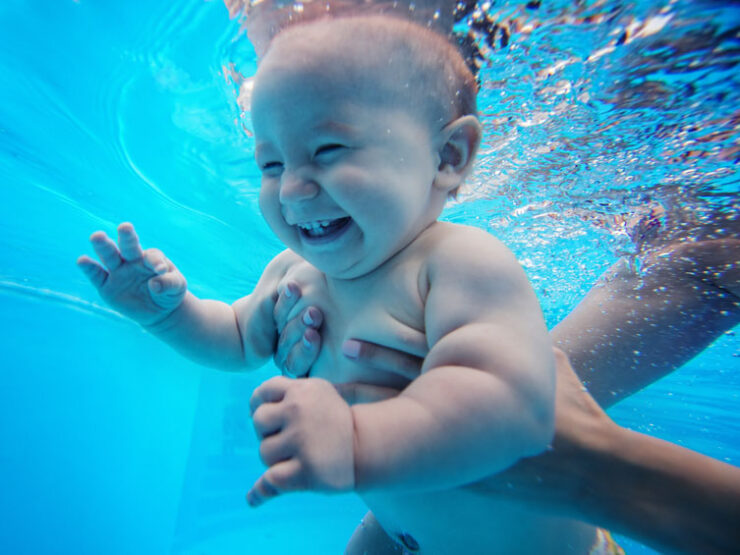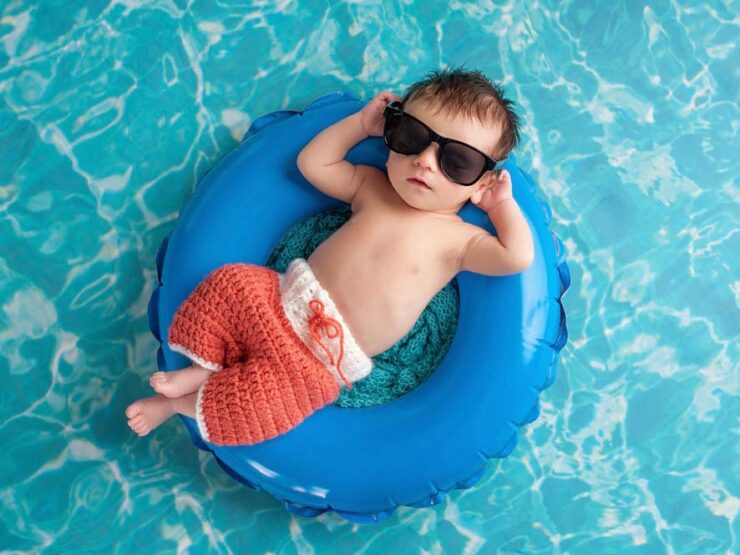If you are a first-time mom, there might be two questions that linger when it comes to taking your baby swimming: is it too early to allow my newborn go swimming, or is it just too late for him? Hence, if you have these same questions as other moms, you should continue reading this article.
When can you really take a newborn to go swimming? Doctors and other moms recommend to let your baby swim in his sixth month. The reason for this is because your baby, in the sixth month, has an improved control in his body specifically his neck, arms, and head; has the ability to regulate his body temperature; and most importantly, has far more resiliency to infections.
Reasons Why Doctors Recommend Six Months
As mentioned, doctors and moms recommend to wait for your baby to turn six-month-old before he starts swimming. However, despite this being a popular recommendation among people, it differs for some. In fact, some recommend allowing your baby to swim anytime before his sixth month as long as you and your pediatrician agree with it.
However, take note that the six-month rule did not just become the most popular opinion without backup facts. To provide you a clearer understanding, read the list below:
- Your baby now gets improved body control. In his six months, your baby now gets an improved body control specifically on his head, neck, and arms. This improvement is indeed vital in helping both of you to be in the same direction when you are in the water.
His head will not just fall on the side everytime you go through the waters. At the same time, your baby need not be fully dependent on your guidance as he paddles in the water with his arms. Hence, this will give both of you a chance to enjoy the moment and move freely on your own.
- Your baby has been well-adjusted with the water temperature. In your baby’s early months, one of the difficulties that he faces is regulating his body temperature. That is why you often cover him with thick clothing and layers to at least keep him warm. Given this case, it is most advisable to let your baby swim in their six months as the cold water may be easy for him to endure.
By your baby’s sixth month, he is now well adjusted to the temperature of the environment, and the low temperature of the water is far more tolerable for him. Hence, you should always consider keeping the water temperature for around 30°C to 32°C.
- Your baby is now more resilient to infectious diseases. In the early months of your baby, his body’s primary responsibility is to build up his immune system. This is done as you allow him to get exposed outside little by little. Your baby’s resiliency issue with infectious diseases is also the reason why it is more advised that you let your baby swim in his sixth month.
After waiting for long six months, he can now shield himself from infectious diseases he might get from the pool – but definitely not all. He will still be needing your guidance in coming up with the decisions when it comes to his health. So, for the first swimming experience of your baby, you can choose indoor pool rather than a public pool. This lessens the chance of getting possible infectious diseases from other people that swim with him.
Myth About Newborn’s Swimming Ability
The belief that your baby experienced a lot of swimming in your womb is what drives others to believe that newborn babies can already swim. Is this myth really true?
The answer is no; this claim is false. Newborn babies do not know how to swim yet, but they have reflexes that look like they know how. To clearly explain what these reflexes are, here are some natural reflexes that babies usually do:
- Diving reflex: The diving reflex also referred to as the bradycardic response is the ability of your baby to hold his breath underwater as part of his natural abilities.
Since this type of reflex has been widely studied, it was proven that there are no instances that a baby swallowed or inhaled water while doing the diving reflex. Amazing, right? Hoping adults can do the same!
- Swimming reflex: This happens when you hold your baby’s tummy in a planking position. Your baby starts paddling and moving his arms and legs as if he really knows how to swim.
These reflexes have been identified to be strong in the first few months, but weakens after their sixth month. I know, it is sad to hear that this special trait of your baby will be gone. But on the bright side, the time after the sixth month is also the perfect time to let him go swimming.
Newborns Swimming In The Pool
Babies can swim in the pool as well. However, it is not recommended until they turn six months old or above as it can be hard for them to regulate their own body temperature in the pool. Aside from that, it can be dangerous for them if they once induce bacteria that may cause diarrhea. Hence, here are the necessary precautions you should consider when taking your baby to the swimming pool:
- Ensure that everything you need is on hand – Towel, diaper, washcloth, and baby clothes are just some of the essentials you should have with you. Unlike adults, babies do not have a lot of alternatives for their basic needs. Thus, leaving a basic thing that he needs will create so much discomfort in his part.
- Check the temperature of the water – If the water seems cold for you, then this surely is colder to your baby. Before actually letting your baby in, it is important that you had your first dip and think how it will feel to your baby’s skin. As babies prefer warm water, the pool should be heated from 30°C to 32°C.
- Dress your baby with appropriate clothes – Make sure that your baby is dressed up with swimwear as this helps him get more comfortable in the activity. A little covering may also contribute to refrain cold air from hitting his skin. Floating rings are not suggested this time as first-time baby swimmers need more of the parents’ guidance.
- Consider the location – Avoid crowded pool as different people carry different bacteria that might affect your baby. At the same time, the noise and chaos might irritate your baby than giving him the chance to enjoy. Hence, it is always a good idea to go to an indoor pool and visit public pools during weekdays when there are fewer people.
- Hold your baby tight – Hold your baby safe as the first swim dictates how it will go for the next few swims. Keep him close to you and hold him in a cradle-like position. This position will make him feel secured and braver to go farther.
Newborns Swimming In The Ocean
As much as we love the view of the ocean, we also love that ocean swims will be shared with our babies. However, there are lots of things to consider before we actually go ocean swimming.
It is more advisable that you take your baby for ocean swimming when they are at least six months old. Unlike swimming in the pool, letting your baby swim in the ocean needs more guidance and alertness from you. Hence, if you are now eager to go for an ocean adventure with your baby who just turned six months, here are the precautions you need to consider.
Related Questions
Are infant swim classes recommended?
The American Academy of Pediatrics (AAP) explains that they still do not recommend swimming classes for infants. Instead, you can enrol your baby once he reached the age one. The primary purpose of swimming classes is to prevent children from drowning.
Since babies do not swim yet on their own, it appears to be impractical as this defeats the purpose of swimming classes. However, if you are up to exercising your baby’s muscles and bones, then swimming classes can still be a great idea.
Do babies need special diapers for swimming?
Yes, mainly if your baby just fed and about to poop anytime. Special diapers prevent from spreading your baby’s poop all over the pool. In choosing one, you should buy the diapers that are designed for swimming. This does not contain water crystals, thus it does not absorb water as well.



